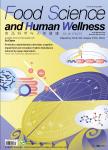Fructose aggravating colon barrier dysfunction by decreasing gut bacteria metabolites indole-3-carboxaldehyde and inhibiting activation of aryl hydrocarbon receptor in vivo and in vitro
作者机构:Academy of National Food and Strategic Reserves Administration Department of Nutrition and Food Hygiene, School of Public Health, Peking University School of Health Science and Engineering, University of Shanghai for Science and Technology
出 版 物:《Food Science and Human Wellness》 (食品科学与人类健康(英文))
年 卷 期:2024年
核心收录:
学科分类:0832[工学-食品科学与工程(可授工学、农学学位)] 08[工学] 083201[工学-食品科学]
摘 要:Background: Fructose may induce non-alcoholic fatty acids (NAFLD) due to the gut-liver axis interactions. The mechanism of fructose impairing colon barrier is unrevealed. Methods: Normal and DSS-induced Sprague-Dawley rats fed by 35% fructose diets were used to evaluate colon barrier functions. Microbiome and metabolome were applied to screen potential biomarker bacteria and metabolites induced by fructose. HT-29 cells were applied to validate metabolite biomarker indoleacrylic acid (IAA) and indole-3-carboxaldehyde (I3A) function in colon barrier which impaired by fructose. Results: Fructose induced colon barrier dysfunction, aggravated colon impairment in DSS-induced rats. With fructose intake, the colon length shortened, goblet numbers declined, inflammation infiltration induced, inflammatory cytokines increased, and apoptosis signals upregulated in colon tissue. Moreover, fructose induced dysbiosis of microbiota and their metabolites. Adlercreutzia, Holdemania were screened out as potential bacteria biomarkers, IAA and I3A as tryptophan metabolites were selected as metabolite biomarkers inhibited by fructose. IAA and I3A treatment alleviated the impairment induced by fructose by increasing trans epithelial electric resistance (TEER) value, tight junction proteins (TJPs), and AhR activity in HT-29 cell. Conclusion: Fructose stimulated inflammation, apoptosis, gut bacteria alteration, and induced the reduction of IAA and I3A. Since fructose inhibited production of IAA and I3A, AhR remained inactivated and consequently induced colon barrier dysfunction.



